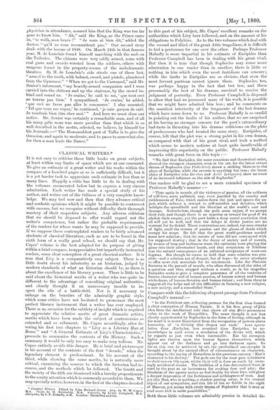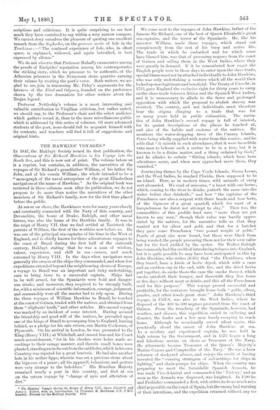CLASSICAL WRITERS.*
IT is not easy to criticise these little books on great subjects, at least within any limits of space which are at our command. To give an estimate of a great writer and his works within the compass of a hundred pages or so is sufficiently difficult, but it is a yet harder task to appreciate such estimate in less than as many lines. Happily a critic has little to do in dealing with the volumes enumerated below but to express a very sincere admiration. Each writer has made a special study of his author, and writes out of the fullness of a very complete know- ledge. We may feel now and then that they advance critical and msthetic opinions which it might be possible to controvert with success, but we recognise without difficulty their thorough mastery of their respective subjects. Any adverse criticism that we should be disposed to offer would regard not the writer's competence, but rather the probable requirements of the readers for whose wants he may be supposed to provide. If we suppose these contemplated readers to be fairly advanced students of classical literature, such as are to be found in the sixth form of a really good school, we should say that Mr. "Capes' volume is the best adapted for its purpose of giving within a brief compass, to appreciative but imperfectly instructed readers, some clear conception of a great classical author. It is true that Livy is a comparatively easy subject. There is as little doubt about his inferiority as an historian, judged by modern standards of what an historian should be, as there is about the excellence of his literary power. There is little to be said about the historical merits of a writer who was quite in- different to the advantage of consulting original authorities, and clearly thought it an unnecessary trouble to in- spect the site of a battle-field. Nor is it necessary to enlarge on the beauties of the admirably graphic styles which some critics have not hesitated to pronounce the most perfect literary instrument that a writer has ever employed. There is nu occasion for the subtlety of insight which is required to appreciate the relative merits of great dramatic artists, merits which have been made the subject of controversies so .extended and so vehement. Mr. Capes accordingly, after de- voting his first two chapters to "Livy as a Literary Mau at Home" and "A General Estimate of Livy's Characteristics," proceeds to summarise the contents of the History. Such a summary it would be only too easy to make very tedious. Mr. Capes entirely avoids this danger. He is brief and picturesque in his account of the contents of the first "decade," when the legendary element is predominant. In his account of the third, while showing the same merits, lie is naturally more critical, examining the sources to which the historian had re- course, and the methods which he followed. The fourth and the moiety of the fifth are dismissed with a brevity proportionate to the scanty attention which is commonly accorded to them. We may specially notice, however, in the first of the chapters devoted • Musical Writers. Edited by John niebard Green. Livy, by W. W. Capes, M.A. Virgil, by H. Nettleship, M.A. Sophodes, by Lewis Campbell, MA. Zurfpides, by J. P. Zachary, A.M. London: Macmillan aLd Co. to this part of his subject, Mr. Capes' excellent remarks on the authorities which Livy here followed, and on the amount of his obligations to Polybius. As to the two volumes which deal with the second and third of the great Attic tragedians, it is difficult to feel a preference for one over the other. Perhaps Professor Mahaffy is more impartial in his estimate of Euripides than Professor Campbell has been in dealing with his great rival. But then it is true that though Sophocles may rouse more admiration in one reader than in another, there is little or nothing in him which even the most fastidious can censure ; while the faults in Euripides are so obvious, that even the most fervent partisan cannot ignore them. Sophocles, too, was perhaps happy in the fact that but few, and these
presumably the best of his dramas, survived to receive the judgment of posterity. Even Professor Campbell is disposed to allow that had we possessed more of his work, it is possible that we might have admired him less ; and he comments on the manifest inferiority of the fragments of the lost dramas which have come down to us. Professor Mahaffy is so candid in pointing out the faults of his author, that we are surprised at his having no stronger censure for the poet's extraordinary bad-taste in thrusting into his dramas criticisms on the plots of predecessors who had treated the same story. Euripides, of course, felt that the plot was a strong point in his own drama, as compared with that of his great rival, and took a method which seems to modern notions at least quite insufferable of impressing this superiority on the public. Professor Mahaffy remarks with great force on this topic :—
" We find that Euripides, the more conscious and theoretical artist, showed the strongest character, even in his art, for the latest extant drama of Sophocles (the Philocietes) shows a striking likeness to the plays of Euripides, while the reverse is anything but true; the latest plays of Euripides (the Beech as and Atilic lphigenia) show no trace of an increased influence on the side of Sophocles."
Our readers will be glad to see a more extended specimen of Professor Mahaffy's manner :—
" Thus again in morals, all the violences of passion, all the coldness of self-love, seem palliated, nay, even justified by the cruelty and ruthlessness of Fate, which smites down the just and spares the un- just, which refuses a reward to self-sacrifice and devotion, which indulges the spendthrift and the libertine at the world's cost and damage. Nevertheless, though the gods seem unjust, if we accept their rule, and though there is no sanction or reward for good if we abolish their empire, yet the poet holds a deep moral conviction that all will yet be well, and that the delays in divine justice are no warrant for its denial. These reservations are, indeed, but rare streaks of light, amid the storms of passion and the gloom of doubt which occupy his stage. He felt that the great world-problems needed some new solution ; that the nature of man did not correspond with his supposed destiny ; that in the decay of society and of morals, by reason of long and barbarous wars, the optimists were playing the game into their adversaries' hands, and that scepticism or Nihilism was the natural consequence of an enforced acceptance of worn-out dogmas. But though he seems to hold that some solution was pos- sible—and a solution not of despair, but of hope—he never attempts to offer more rich materials for its attainment. Like the Platonic Socrates in the pursuit of morals, who often discussed all the sides of a question and then stopped without a result, so in his tragedies Euripides seeks to give a complete panorama of all the varieties of human character and of human passion, of human misery and human wickedness, of human devotion and human valour ; and from these to suggest all the helps and all the difficulties in forming a new religion, a new society, and a remodelled State."
Compare with this the following eloquent passage from Professor Campbell's manual :—
"In the Periclean age, reflecting persons for the first time formed a clear conception of Human Nature. It is his firm grasp of this idea from the intellectual side that above all else gives permanent value to the work of Thucydides. The same thought is not less clearly apprehended by Sophocles in the form of feeling, although in his mind it is never dissociated from the recognition of powers above humanity, of a divinity that shapes our ends.' Less specu- lative than YEschylus, less sceptical than Euripides, he ac- knowledges in each event a revelation of the divine will, which he regards as just even when inscrutable. But his strongest lights are thrown upon the human figures themselves, which appear out of the darkness and go into darkness again. So far as this can be achieved by art, the predestined catastrophe is brought about by the natural effect of circumstances on character, according to the saying of Heraclitus in the previous century, Man's character is his destiny.' The gods are for the most part withdrawn to their unseen Olympus, whilst their will is done on earth by seem- ingly accidental means. The tradition of a fore-determined doom is used by the poet as an instrument for evoking fear and pity; the blindness of the agents makes us feel doubly for their fate, and gives a deeper impression of the feebleness and nothingness of man. And yet this Man, who is nothing, a shadow passing away, is the central object of our sympathies, and this life of his, so feeble in the sight of Heaven, yet seems with every drama of Sophocles that is seen or
read more rich in noble possibilities."
Both these little volumes are admirably precise in detailed de-
scriptions and criticisms. It is quite surprising to see how much they have contrived to say within a very narrow compass. We cannot deny ourselves the pleasure of quoting one excellent remark from the Sophocles, on the persona mula of Iole in the Trachinae :--" The confused experience of Iole, who, in short space, is orphaned, widowed, and again betrothed, is best expressed by silence."
We do not observe that Professor Mahaffy enumerates among the proofs of Euripides' reputation among his contemporaries the striking story, which we presume to be authentic, of the Athenian prisoners in the Syracusan stone quarries earning their release by reciting the poet's verse. Both writers, we are glad to see, join in traversing Mr. Paley's arguments for the lateness of the Iliad and Odyssey, founded on the preference shown by the two dramatists for other writers about the Trojan legend.
Professor Nettleship's volume is a most interesting and valuable contribution to Virgilian criticism, but rather suited, we should say, to the Professor's chair and the select audience -which gathers round it, than to the more miscellaneous public which is addressed by this series of volumes. Of more advanced students of the poet, none should fail to acquaint himself with its contents, and teachers will find it full of suggestions and original hints.



































 Previous page
Previous page